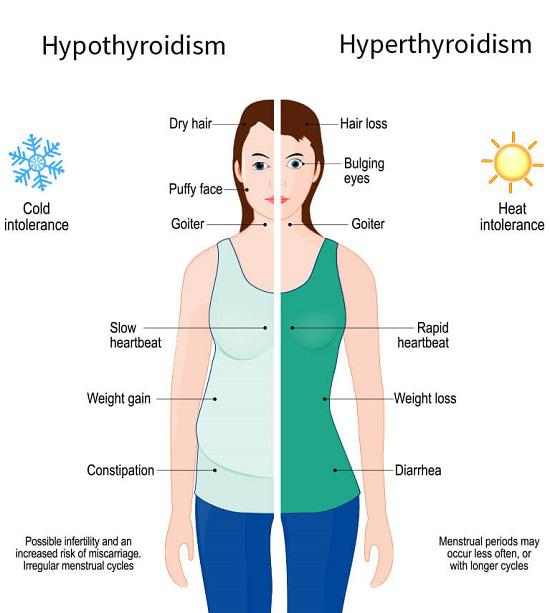Subscribe to get weekly insights
Always stay up to date with our newest articles sent direct to your inbox
Published on 3 Nov, 2022
Updated on 30 Mar, 2025
5085 Views
4 min Read

Written by Care Health Insurance
favorite2Likes
As petty as it may appear, the thyroid gland sits at the centre of your body’s well-being. One of the most significant hormone-secreting glands, the thyroid needs as much care and attention as any other body part. Especially during the winter, thyroid patients should take special care of their hormone levels with natural and medical remedies whenever needed.
While thyroid levels keep fluctuating throughout the year, the hormone flow slows down naturally during the winter. So, even people with no thyroid symptoms may experience a rise in their TSH levels (Thyroid Stimulating Hormone) when it turns cold outside.
In this article, we shed light on everything you need to know about thyroid gland disorders and self-care tips for winter.
One of the most important endocrine glands – the thyroid – sits in front of your neck, right below Adam’s apple. The butterfly-shaped gland has two lobes facing each other while covering the windpipe on either side. The lobes are bridged by the thyroid tissue called the isthmus.
The thyroid gland produces and releases two hormones, termed T3 or triiodothyronine and T4– thyroxine. Here, your brain’s pituitary gland also plays a vital role in releasing the TSH or thyroid-stimulating hormone that triggers the thyroid to release its own hormone juices. These hormones help regulate every cell in your body while keeping your organs healthy and active..
Wondering what else the thyroid gland does? Here are its other functions:
In simple words, the thyroid gland influences every cell and all major body organs while determining your overall growth and development.
The well-known TSH test checks on your thyroid and its functioning while measuring your T3 and T4 levels. So, if you notice higher TSH levels, it is so to push your underactive thyroid into producing more thyroid hormone to meet the body’s needs. Inversely, low TSH levels indicate that the thyroid problems of producing excess hormones than what your body needs.
The two different types of thyroid issues are:

Hypothyroidism: Under this condition, the thyroid lacks the ability to create and release adequate amount of thyroid hormones into the bloodstream. The lower the thyroid levels, the lower your metabolism falls. With a slowing down metabolism, a person with hypothyroidism always feels exhausted while developing symptoms like dry skin, puffy face, heavyweight, or worse depression.
Hyperthyroidism: Unlike the other type, hyperthyroidism sees the body creating and releasing higher levels of thyroid hormones. Also, referred to as the overactive thyroid, this condition causes people to lose weight, become anxious, notice rapid heartbeat, and increased appetite. That’s how you identify if you are struggling with a hyper or hypo condition of the thyroid.
Read more about these two thyroid conditions here.
Your metabolism directly affects the way your body responds to climate changes. The stronger the metabolism, the more adaptive your body becomes. When dealing with thyroid – especially hypothyroidism – your body’s metabolism slows down, affecting patients to feel colder and more frigid during the winter season.
Thus, hypothyroidism patients need to take extra care of their condition and health status with the following tips:
Given the naturally higher TSH levels among people of all ages, it is important to check your TSH levels regularly. Especially before and after the onset of winter, you must check and identify any anomalies. Too high or too low TSH readings point out a dysfunctioning thyroid. Save the table below to remember the ideal TSH levels:
| Age Brackets | Normal TSH Level |
|---|---|
|
0 to 5 years |
0.7 - 15.2 micro-international units per millilitre (uIU/mL) |
|
6 to 90 days |
0.72 - 11.0 uIU/mL |
|
4 to 12 months |
0.73 - 8.35 uIU/mL |
|
1 to 6 years |
0.7 - 5.97 uIU/mL |
|
7 to 11 years |
0.6 - 4.84 uIU/mL |
|
12 to 20 years |
0.51 - 4.3 uIU/mL |
|
21 to 99 years |
0.27 - 4.2 uIU/mL |
Care Health Insurance helps you check on your body’s overall functioning with the benefit of annual health check-ups. Whether young or old, policyholders with Care Health Insurance Plans can undergo free health check-ups, including standard blood tests, lipid profiles, TSH tests, and liver and kidney functioning tests. It helps you take preventive measures to reverse the symptoms early on.
With lower thyroid levels, your body needs extra energy and warmth that is not produced by the body naturally. Thus, winter is the best season to bask in the warmth of the Sun while munching on dry fruits like almonds and hazelnuts. Also, avocados, coconut oil, and peppers are other foods to add to your thyroid-prevention diet plan.
A physically active lifestyle is the most effective natural remedy for treating thyroid. The more consistent you become, the more balanced will be your hormone levels. Start with a 20-30 minute walk followed by light exercises while increasing the workout period as your stamina and strength improves.
While physical exercises will help you keep your cravings at bay – it is essential that you make extra efforts to stop these cravings. Switch to healthy snacking while limiting the intake of fatty and processed food. The more protein and starch-rich fruits and vegetables, the better.
At Care Health Insurance, we support you in maintaining a healthy lifestyle. Our health insurance policies not only promise financial security but also health care coverage. Our policies offer several value-added benefits like annual health check-ups, doctor-on-call, diagnosis, e-consultations, and OPD coverage. These features help you keep a check on developing health issues at the very initial stage with proper medical care. So, choose Care Health Insurance as your health partner to ensure healthy living, now and forever.
Thyroid : मामूली नहीं हैं महिलाओं में थायराइड होना, जानें इसके लक्षण और घरेलू उपचार Vipul Tiwary in Diseases
शुगर कंट्रोल कैसे करे? जानें, डायबिटीज में क्या खाना चाहिए Vipul Tiwary in Health & Wellness
हाई ब्लड प्रेशर को तुरंत कंट्रोल कैसे करें? देखें इसके उपाय Vipul Tiwary in Diseases
पैरों में दर्द किस कमी से होता है? जानें, इसके घरेलू इलाज Vipul Tiwary in Health Insurance Articles
Struggling with Ear Ringing? Explore Hyperacusis Treatment Strategies Nidhi Goyal in Health Insurance Articles
Mohs Surgery for Skin Cancer: Why it Delivers the Best Results? Jagriti Chakraborty in Surgery
Beyond the Kissing Disease: A Quick Guide to the Epstein-Barr Virus (EBV) Mudit Handa in Diseases
Triphala, From Tradition to Trial: How Modern Science backs its Gut Benefits Mudit Handa in Diet & Nutrition
Always stay up to date with our newest articles sent direct to your inbox
Loading...